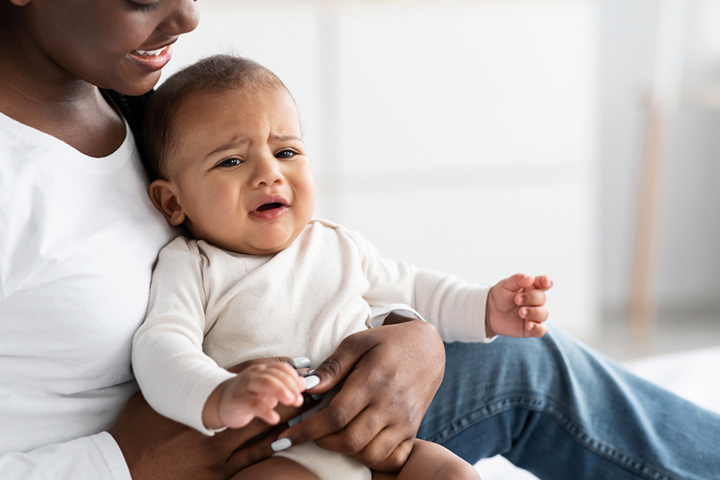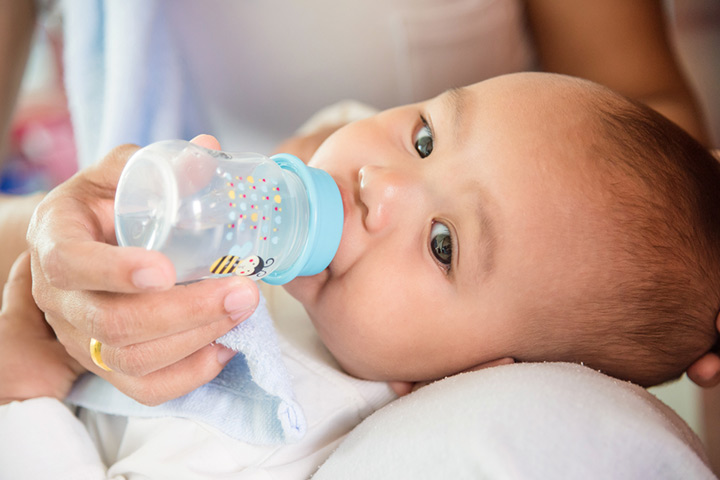
Image: Shutterstock
We often treat our babies with the utmost care, given how delicate and fragile they are. It breaks our hearts when we see them in distress, so we do whatever we can to help them navigate their pain and discomfort. One such example is when your child is constipated. Constipation can be painful and uncomfortable. When we see that our child is struggling with their bowel movements, it is normal for us to do what we can to relieve them. Several home remedies and tips have been passed down from well-meaning elders; however, sometimes, these things can do more harm than good.
Constipation in infants should be treated with care under the guidance of a doctor. It is best to avoid taking matters into your own hands, as it may harm your baby. We’ve listed five things that you should avoid doing at all costs when your baby is constipated:
1. Performing A Rectal Stimulation
Image: Shutterstock
On some occasions, if your baby is struggling to pass motion, their pediatrician may use a probe to trigger a reflex, which can help your baby pass stool more effectively. Upon noticing this, many parents resort to doing the same on their own when their babies are constipated. Thermometers or pencils are lubricated with the help of petroleum jelly and gently inserted into the babies’ rectum to stimulate bowel movements. While it may work effectively, it is recommended not to perform a rectal stimulation on babies when they are constipated, and there is a good reason you are asked to avoid this.
When a baby tries to poop, they first relax their bottoms and gently push so that their muscles work to push out poop. If you perform rectal stimulation regularly, your child may get dependent on this and refrain from trying to stimulate bowel movements on their own. There have been several instances where babies get used to external rectal stimulation, thereby finding it hard to pass motion without outside help (1).
2. Expecting Regular Bowel Movements
Image: Shutterstock
During the first few weeks of a baby’s life, soiled diapers are common. Babies tend to poop after almost every two or three feeds and may require regular diaper changes as well. However, just like the rest of their bodies, a baby’s digestive system is constantly developing. As they grow older, the number of bowel movements they pass on average may decrease. Parents often worry when this happens and assume the worst. You need to know that sometimes, they may poop twice a day, and at other times, they may go a day or two without pooping — both are fine and usually not a cause for concern. If you find that something is wrong, you should consult the doctor to be on the safer side (2).
3. Using Laxatives Or Force
Image: Shutterstock
Although well-meaning, many mothers use certain laxatives or measures of force such as an oil massage on the tummy, application of mineral oils in the private areas, or an enema. It is essential to know that such measures can cause your baby distress and do more harm than good. Pressing your baby’s stomach too hard can hurt them. Similarly, enemas or the application of mineral oils to private areas may cause infections. If your baby is suffering from constipation, a doctor might prescribe a glycerin-based rectal suppository that will bring relief. This should only be done with the recommendation of a doctor.
4. Lowering Fluids And Increasing Fiber Content
Image: Shutterstock
We’ve been told repeatedly that fibers are the leading players for healthy bowel movements — this is a fact, but there is more to it. Consuming only fibers can have the opposite effect and lead to constipation. To help counter this, fibers must always be accompanied by a good amount of fluids. Babies below six months of age have limited options: milk or baby formula should suffice. After six months of age, they are usually given solids and water. Make sure you slowly introduce your child to solids; this should first be given alongside their regular baby formula or breast milk intake. As you introduce them to solids, you can give them small amounts of water (3), (4).
5. Misinterpreting Your Child’s Facial Expressions Or Signs
Image: Shutterstock
We’re well aware of the “poop face”, particularly in babies. The one where you know they are putting in a reasonable amount of effort to pass motion. This particular expression can turn into a grimace, especially when struggling to pass their bowel movements. Sometimes, it could be that your child has this face on but isn’t necessarily constipated. You may be misinterpreting their facial expressions and signs, assuming that they are constipated when they are actually not.
Your child’s bowel movements (or the lack thereof) may be a pressing issue (literally!). However, it is best to seek professional guidance and medical intervention if you see that your baby is in distress. Have you been guilty of indulging in the above things when your child is constipated? What are some of the safe remedies that seem to work for infant constipation? Let us know in the comments below!

















